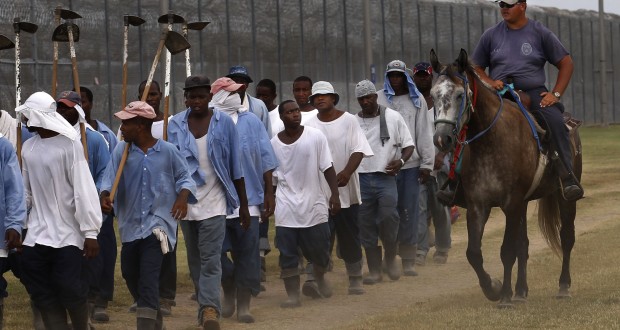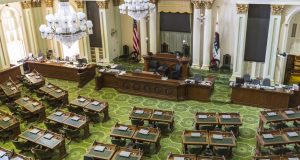By Aldon Thomas Stiles
The story of Black people in the U.S. has always been one of triumph in the face of impossible odds. It is the heritage of an entire people that rose from bondage and overcame one of the greatest atrocities in human history. June 19, 1865 marked the end of legal slavery for Black people in the U.S. and ushered in a new age of progress. But with the reality of residual intolerance and an economy built on free labor, those who escaped the chains of subjugation often found themselves bound by those very chains once again under a new name: Prison.
According to the Institute for Criminal Policy Research, the U.S. represents under 5 percent of the world’s population and over 21 percent of its prisoners. Mass incarceration in the U.S. has a long and arduous history that can be directly traced back to the end of slavery. In regard to the prison system in the U.S., Criminal Justice Attorney Vonya Quarles, who spoke during the Inland Empire Women’s March, said, “We have an addiction to cheap labor. We have an addiction to slavery.” Slavery existed as an economic system and when it went, our economic security almost went with it. Thus, began a trend of criminalizing and incarcerating Black people for small infractions in order to exploit them for cheap labor.
In the late 60s, the rhetoric surrounding criminality became far more hostile in nature. The heavily criticized “War On Drugs” painted drug addiction as a criminal issue and not a health issue. John Ehrlichman, former advisor to President Richard Nixon, said about the “War On Drugs” that “the Nixon campaign in 1968, and the Nixon White House after that, had two enemies: the anti-war left and Black people… We knew we couldn’t make it illegal to be either against the war or Blacks.”
According to the NAACP, African Americans “constituted 2.3 million, or 34 percent, of the total 6.8 million correctional population.” African Americans make up about 13 percent of the world’s population but comprise over one-third of the country’s prison population. Regarding San Bernardino, CA, Dr. Annika Anderson, Assistant Professor in the Department of Sociology at California State University, San Bernardino and Project Director of Project Rebound, wrote in an email, “In 2014, in San Bernardino, African Americans had the highest jail incarceration rate (958.3 per 100,000), followed by Whites (420 per 100,000) and Latinos (354.2 per 100,000) with significantly lower rates.” Anderson went on to discuss how community context also plays a role in the high recidivism rate for African Americans in California, which was at 66.1 percent as of 2013 according to the Department of Corrections and Rehabilitation.
There are, however, programs in the Inland Empire area that aim to help this special population. Project Rebound, for example, is a program on CSUSB’s campus that helps formerly incarcerated students attend classes and work towards a degree. “The CSU Chancellor’s office supported the development of Project Rebound programs at all CSU campuses, and CSUSB is one of several pilot efforts,” Anderson wrote in an email. “We have established relationships with several community colleges, three reentry centers, and provided outreach efforts to potential students who are currently incarcerated at several prisons (e.g. Chino Institute for Women, Chino Institute for Men, CRC Norco, and Chuckawalla prison).”
Another resource for the formerly and currently incarcerated is the grassroots human rights group known as All of Us Or None based in Southern California. Their goal is to fight for the rights of these people and “strengthen the voices of people most affected by mass incarceration and the growth of the prison-industrial complex.” During their monthly meeting, the group discussed policies such as Assembly Bill 1008, the California Fair Chance Act, which prevents employers from performing a background check into the criminal record of potential employees until the former has officially offered them a position. Members in attendance also discussed the Voting Restoration and Democracy Act of 2018, a bill that proposes to restore the voting rights of those in state prisons and on parole. Riverside County Supervisor Candidate Penny Newman attended this meeting as well. She remarked, “The whole criminal justice system is screwed up. In fact, our society is screwed up.” This idea seemed to echo Vonya Quarles’ opening statement during her speech at the Inland Empire Women’s March. As thousands of people cheered, Quarles said, “We don’t have a justice system, we have an injustice system.”
 Westside Story Newspaper – Online The News of The Empire – Sharing the Quest for Excellence
Westside Story Newspaper – Online The News of The Empire – Sharing the Quest for Excellence




